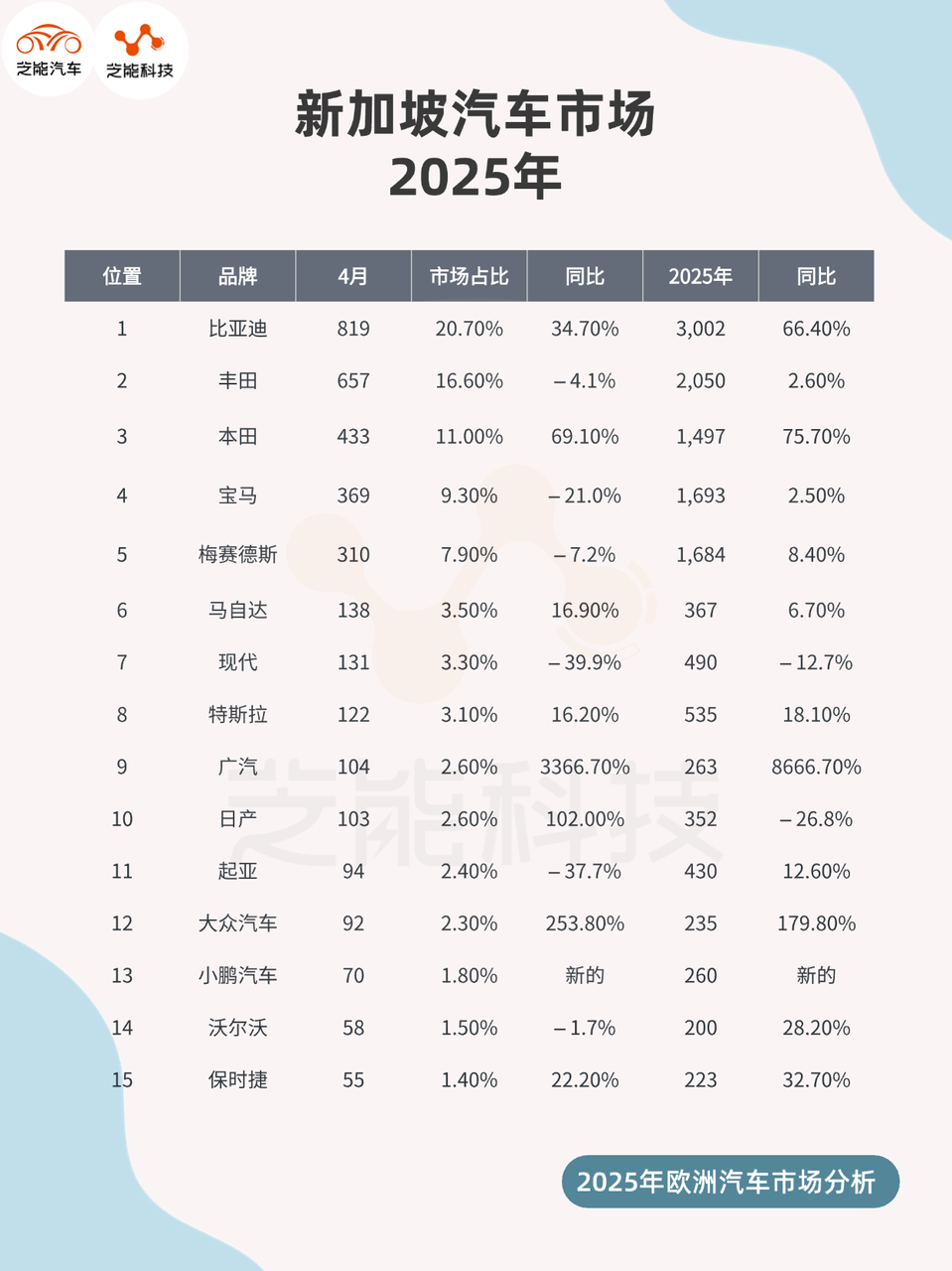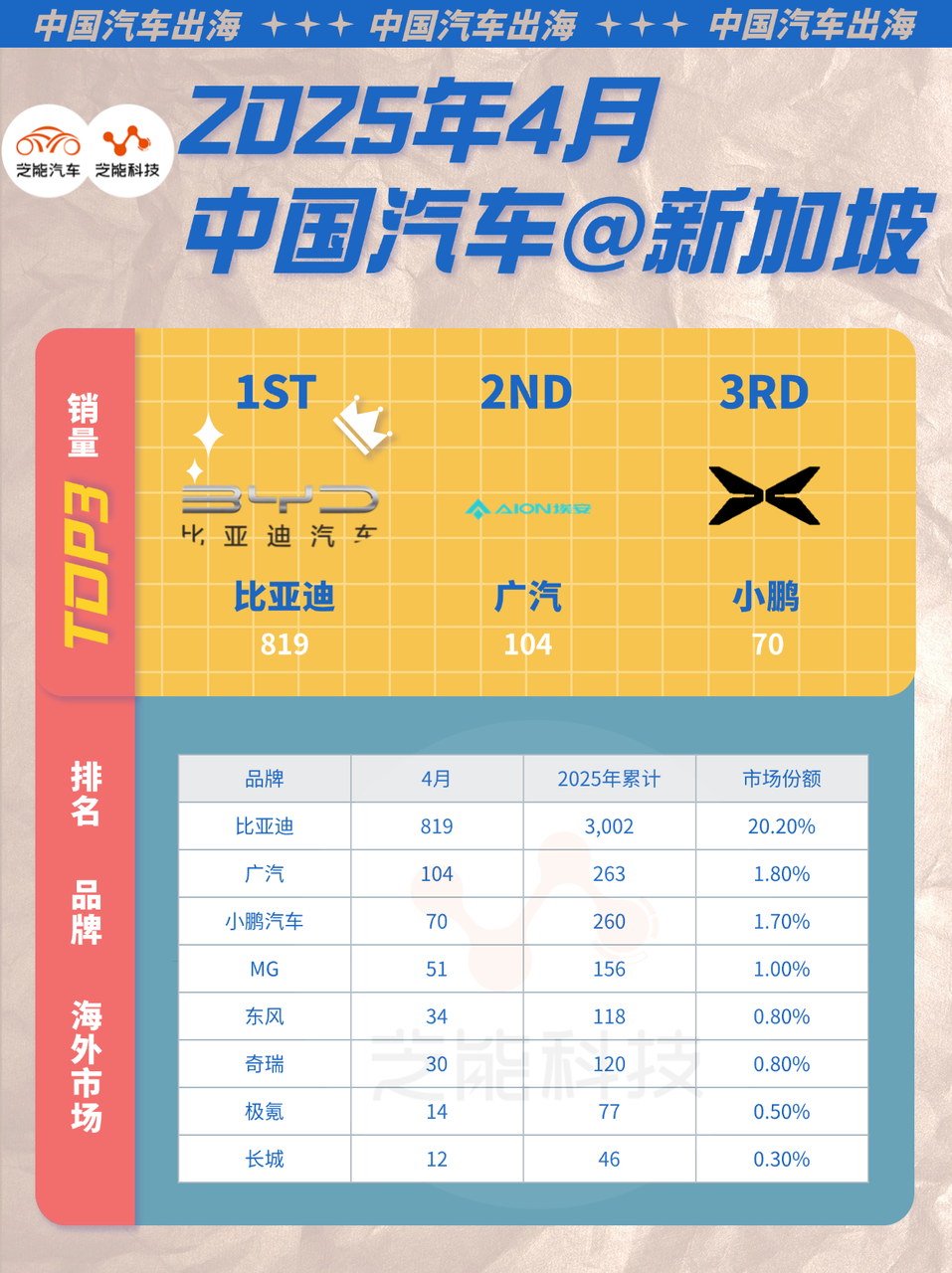Asian Auto Market | Singapore in April: BYD Leads the Charge, with GAC and Xpeng Gaining Momentum
![]() 05/19 2025
05/19 2025
![]() 816
816

In April 2025, Singapore's new car market extended its growth trajectory, recording a 14.4% year-on-year surge in sales.
BYD solidified its top position with a 20.7% market share, further widening its lead. Chinese brands like GAC and Xpeng Motors have now entered the mainstream, aiming to dominate the Southeast Asian automotive stage.
ChiEnergy Tech observed that Chinese automotive brands are achieving rapid breakthroughs in Singapore, a high-end mature market, leveraging product strength and price advantages to redefine the local market's competitive landscape.
01
Singapore Market Overview:
Electrification Trend Persists,
Chinese Brands Enter Mainstream
Singapore's total new car sales in April amounted to 3,949 units, up 14.4% year-on-year; cumulative sales since the start of the year have reached 14,863 units, marking a 28% increase over last year. Market vitality has bounced back significantly, and the trend towards electrification is deepening.
● Among the leading brands:
◎ BYD clinched the top spot for the fourth consecutive month with 819 units sold, maintaining monthly growth and a 20.7% market share, nearing the all-time high set in February last year. Since the beginning of the year, BYD's cumulative deliveries have surpassed 3,000 units, cementing its leading position.

◎ Toyota ranked second with 657 units sold, experiencing a slight decline and holding a 16.6% share.
◎ Honda performed impressively, recording a 69.1% year-on-year increase to 433 units, emerging as the month's biggest dark horse. The German luxury brands BMW and Mercedes-Benz delivered 369 and 310 units respectively, but both showed a year-on-year decline, indicating the pressure on high-end models in the current consumer environment.
◎ In the new energy vehicle segment, besides BYD, Tesla ranked among the top ten with 122 units sold, while Mazda, Nissan, and Hyundai also made progress in their electrified product lines.
◎ GAC Group achieved explosive growth in Singapore with the Aion EV model, selling 104 units, representing a year-on-year increase of over 33 times. This marked GAC's first entry into the monthly top ten, ranking ninth.
● From a competition pattern perspective:
The market is gradually transitioning from being dominated by traditional Japanese and German brands to being led by electric vehicle brands.
◎ BYD not only leads in sales but has also established a brand image as the "mainstream choice for electric vehicles" among consumers;
◎ The rapid growth of brands such as GAC and Xpeng also reflects the growing acceptance of Chinese electric vehicles in the Singapore market.
02
Rising Chinese Brands:
BYD Asserts Dominance,
GAC, Xpeng, and Others Flourish in Various Areas

◎ BYD continued to extend its lead, with April sales accounting for over one-fifth of the market, underscoring its dominant position in Singapore.
◎ GAC Aion sold 104 units in April, experiencing a year-on-year increase of over 3300%. Cumulative sales for the year reached 263 units, lifting its market share to 1.8%.
◎ Xpeng Motors closely followed with 70 units sold in April, accounting for a 1.8% market share, and cumulative sales reaching 260 units since the beginning of the year. Other Chinese brands such as Chery, Dongfeng, Great Wall, SAIC MAXUS, and Zeekr are also gradually establishing their presence in the market. Chery sold 30 units, marking a year-on-year increase of nearly 30 times, while Dongfeng delivered 34 units and Zeekr delivered 14 units.
From a brand structure perspective, Chinese automakers have established a multi-tier, multi-positioning competitive layout in Singapore.
Summary
As a representative market characterized by high income levels, transparent policies, and mature consumption patterns, Singapore has long been regarded as a testing ground for international automotive brands. BYD's continued leadership not only reflects its robust system in terms of product performance, channel capabilities, and after-sales support but also demonstrates that Chinese brands are no longer solely associated with cost-effectiveness. They are now key players in the dual tracks of electrification and intelligence. The rise of brands such as GAC and Xpeng further illustrates that in the global market, Chinese automakers are gradually shedding their "follower" role and accelerating their penetration into mainstream markets with their platform capabilities and intelligent technologies. Whether Chinese automakers can solidify their presence in Singapore and expand to more countries in Southeast Asia will become a crucial indicator for observing the "intelligent electrification going global" trend.







